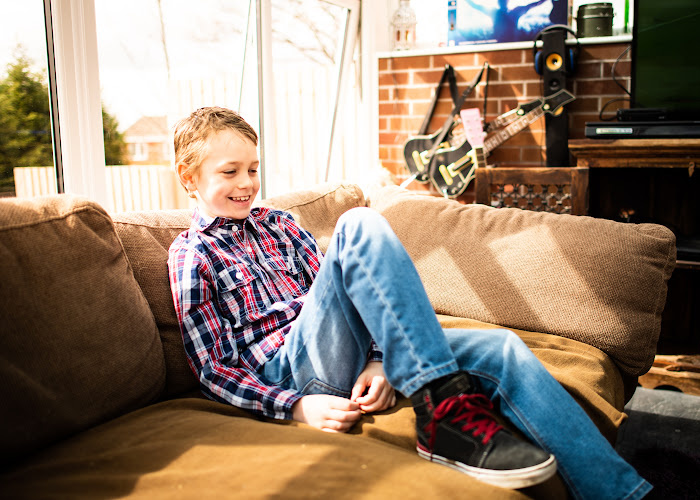It's crucial to know that students with autism and ADHD need special study strategies. Autism…

How to Help Manage Inappropriate Laughter in Autism
Inappropriate or sudden laughter is a common symptom of autism spectrum disorder (ASD). It can happen frequently and at unexpected times. While laughter is normal, excessive or inappropriate laughter can be disruptive. As a caregiver, you may be wondering how to help manage inappropriate laughter in autism.
Laughter serves an important social function. It helps form connections and bonds. It also promotes positive emotions. However, for many people with ASD, laughter happens spontaneously, without social context. Alternatively, they may laugh in tense or serious situations. This understandably causes confusion and distress for caregivers.
The good news is there are constructive ways to help people with autism gain control over inappropriate laughter. With patience and the right strategies, you can make a big difference. Here are some proven tips for helping individuals manage inappropriate laughter related to ASD:
Understanding the Cause of inappropriate laughter
First and foremost, aim to understand why inappropriate laughter occurs. There are a few key reasons:
Emotional release: Laughter may act as an emotional release valve. When feelings build up, laughter discharges them.
Social confusion: Difficulty reading social cues may prompt laughter at odd times.
Sensory release: Laughter might relieve sensory overload.
Communication: Some people use laughter to connect since conversation is challenging.
Tics: Involuntary laughter may be a vocal tic for some people.
Anxiety: Nervous laughter can erupt when someone feels anxious.
Knowing the likely cause helps you address the behavior more effectively.
Avoid Punishment
It’s understandable to feel frustrated when laughter happens incessantly. But reacting harshly or punishing the behavior will only add stress. This leads to more inappropriate laughter, not less.
Instead, be patient, compassionate, and solution-focused. This fosters trust and cooperation.
Watch for Triggers
Pay attention to when inappropriate laughter tends to occur. Keep a record of laughing episodes. Look for any patterns or common triggers like stress, excitement, anxiety, boredom or social situations.
Understanding triggers allows you to anticipate laughter and proactively manage it. If you notice pre-laughing behavior like fidgeting or making odd noises, you can gently intervene.

Teach Coping Strategies
Equip the person with alternative coping strategies. This gives them more control. Useful strategies include:
Deep breathing: Slow deep breaths can calm the urge to laugh.
Counting: Silently counting to 10 (or 20, 50 etc) can be distracting and relaxing.
Squeezing a stress ball: This redirects energy away from laughing.
Listening to music: Soothing music changes the mood and focus.
Taking a break: Stepping away for a short break can ‘reset’ the system.
Humming: Humming a simple tune engages the mind.
Have the person practice these coping mechanisms when they are calm. Then prompt them to use a strategy when laughter starts. Over time, this builds up their skills.
Reinforce Replacement Behaviors
When laughter happens, gently redirect the person to a more suitable behavior. For example, you could encourage them to:
- Make a neutral comment
- Ask a relevant question
- Give a compliment
- Take deep breaths
Stay calm and patient. Use praise and rewards to motivate them. Be consistent.
Use Visual Cues
Visual cues are very helpful for people with autism. Develop a simple, agreed upon hand signal or cue. Demonstrate this signal when laughter occurs inappropriately. It reminds them to use coping strategies.
You could also make a ‘laughter sign’ for their workspace or bedroom. A visual cue grabs their attention without being confrontational.
Avoid Secondary Reinforcement
Be cautious not to reinforce the behavior. Giving excessive attention or strong reactions can inadvertently encourage more laughing. Instead, remain neutral and calmly redirect.
Consider Medication
If involuntary laughter is severe, consult a doctor. Certain medications can help reduce extreme bouts. But medication should be used selectively and monitored carefully.
Practice Social Skills
Build social awareness and skills through role playing and rehearsal. Practice appropriate vs inappropriate laughing. Share constructive feedback in a sensitive way. Improved social ability helps prevent awkward social laughter.
Use Humor Thoughtfully
Humor can backfire with autism. Sarcasm, teasing or jokes can inadvertently trigger laughing. However, good-natured humor can also relax and connect. Notice when humor works well or falls flat. Avoid mocking and use your best judgment.
Stay Positive
Most of all, remain encouraging and optimistic. Improving social communication and coping ability takes time for people with ASD. Celebrate small wins. Your support and belief in them makes all the difference.
Conclusion
Managing excessive, inappropriate laughter presents challenges for those with autism. But don’t despair. You can help improve the situation. Notice patterns and triggers. Teach coping strategies. Use visual cues, redirection and reinforcement. Medication may also help in some cases. Above all, stay patient, compassionate and hopeful. With consistent effort inappropriate laughter can be minimized, allowing for more positive social interaction.

Frequently Asked Questions
Here are answers to some common questions about dealing with excessive or inappropriate laughing in autism spectrum disorder (ASD).
What causes inappropriate laughter in autism?
Inappropriate laughter can be triggered by various factors like stress, anxiety, excitement, social confusion, sensory overload or as a tic. Understanding the cause helps address the behavior.
How can I calm someone down when they laugh inappropriately?
Gently redirect them to take deep breaths, count backwards, squeeze a stress ball or use other coping strategies. Remain patient and calm. Avoid overreacting.
What should I do when my autistic child laughs at the wrong time?
Stay calm and neutral. Gently remind them that laughter is not appropriate right now. Suggest a more suitable response like a relevant comment. Use praise and rewards to reinforce good behavior.
How can I tell if laughter is a tic or involuntary?
Tic laughter is often frequent, repetitive and consistent. It feels involuntary versus emotionally driven. Consult a doctor to help determine the cause.
Can counseling help manage inappropriate laughter?
Yes, counseling can teach vital coping skills. Cognitive behavioral therapy can retrain reactions over time as well. Social skills classes are also very beneficial.
How can I track causes and patterns of inappropriate laughter?
Keep notes on each laughing episode – what triggered it, how long it lasted, what helped, etc. Look for insights on settings, activities or cues. This helps manage it proactively.



This Post Has 0 Comments